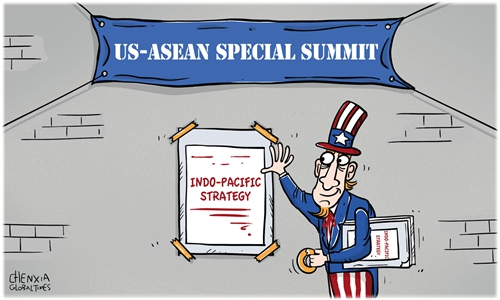
ASEAN flag. Photo: VCG
After the White House unilaterally announced that President Joe Biden would play host to a special summit of the US and Southeast Asian leaders on March 28 and 29 in Washington, a series of reports about a possible delay because of an apparent scheduling rift between the two sides have emerged. Prak Sokhonn, the current chair of ASEAN and foreign minister of Cambodia, finally announced the summit would be "postponed to a later date because some ASEAN leaders cannot attend the meeting on the proposed dates." No new date has been proposed for the summit.
It's reported that some ASEAN members had asked for the summit to be held two days earlier. Apparently, the request wasn't met. A Diplomat article commented that it's surprising that the communication between ASEAN and Washington was not more cohesive, and that the two sides did not finalize a date before announcing the summit. However, it's nothing surprising at all.
It was an uncomfortable episode for ASEAN countries, and a reflection of the US' bossy style. The US-ASEAN relationship is not equitable. It takes time for the leaders of ASEAN, a bloc of 10 countries, to coordinate an available date for the summit. But the US, like a big boss, set the date and asked its ASEAN "partners" to attend, which showed its arrogance and intention to dictate issues in the US-ASEAN ties. Clearly, Washington hasn't treated ASEAN countries equally - instead, it just wants ASEAN countries to listen to its orders.
Perhaps it's because Biden is occupied that some ASEAN countries' request to hold the summit two days earlier hasn't been responded to. ASEAN has been put behind other agendas by the US many times. Former US president Donald Trump skipped summits with his Southeast Asian counterparts for three consecutive years. US Secretary of State Antony Blinken left top diplomats from across Southeast Asia waiting 45 minutes before blank screens during a virtual meeting in late May last year.
In such a context, even if the US-ASEAN summit is held later this year, doubts remain whether it can really help promote the relationship between the US and ASEAN. The US will only focus on topics of its own interests, not care about ASEAN's demands and concerns at all.
In its long-awaited Indo-Pacific Strategy, which was revealed in February, the US made it clear that Southeast Asia would be at the center of its plans for the region. It claimed that it "endorses ASEAN centrality and supports ASEAN in its efforts to deliver sustainable solutions to the region's most pressing challenges." But the "ASEAN centrality" that Washington supports is not the same sense as what ASEAN pursues. What the US cares about is whether ASEAN can play a leading role in offsetting China's influence in the region.
In fact, the importance of ASEAN lies in its impartiality, independence and non-alignment. It cannot and shouldn't take sides between China and the US. Some ASEAN countries are allies to the US, but the bloc's independence is an important prerequisite for the organization to play a constructive role in the region. Many elites in ASEAN countries are already aware of this point. Therefore, they support ASEAN in taking a balanced attitude toward China and the US. Since last year, the Biden administration has increased its diplomatic offensive to draw ASEAN to its side against China, which has only been met with ASEAN's cold shoulder. Many member countries within ASEAN are unwilling to be tied to the US' anti-China agenda.
The US' intention is clear: to use ASEAN countries as tools against China. But those Southeast Asian countries won't be fooled. ASEAN and China have enjoyed profound economic, strategic, cultural and historical exchanges. ASEAN's relationship with China is much closer than that with the US. Besides, ASEAN countries have had enough US directives. Instead of becoming pawns in the US' Indo-Pacific Strategy, they are more interested in seeking to expand ties with China in many sectors, and are committed to promoting Asia-Pacific economic integration, all of which are more in line with their interest.
The article was compiled by Global Times reporter based on an interview with Li Haidong, a professor from the Institute of International Relations of China Foreign Affairs University. opinion@globaltimes.com.cn

